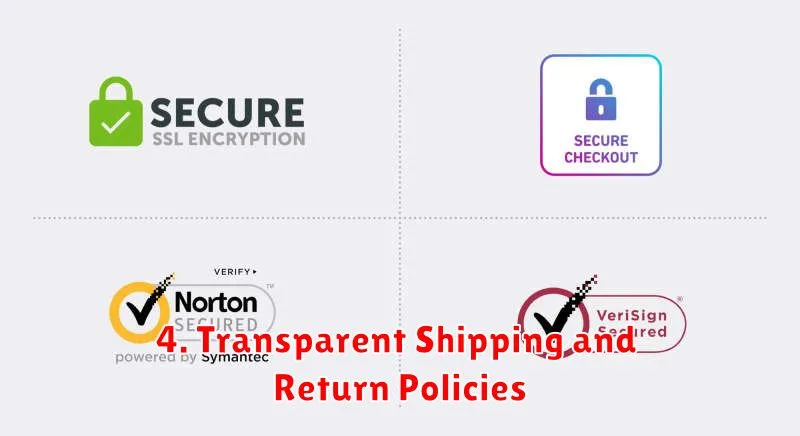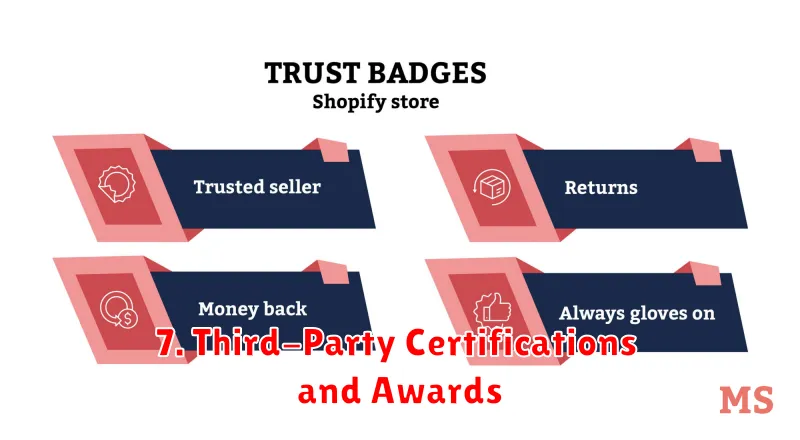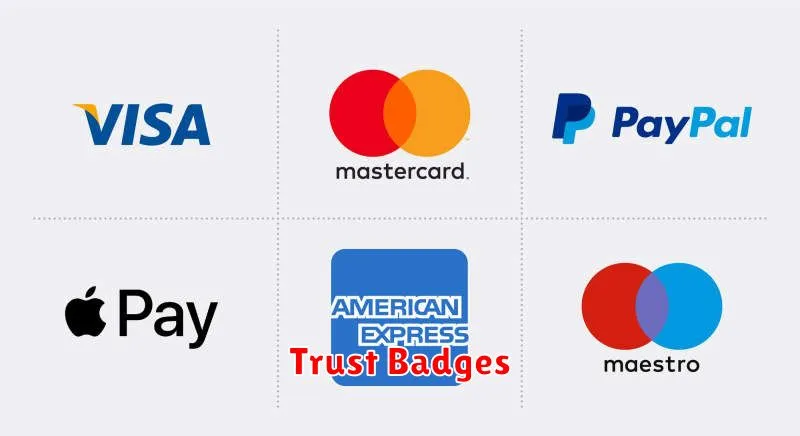In today’s digital marketplace, consumers are more discerning than ever. They crave authenticity and are quick to sniff out any hint of deception. This has created a new imperative for ecommerce businesses: building trust through transparency. While trust might seem like an intangible concept, it’s actually the foundation of every successful online business. Without it, potential customers will hesitate to hand over their hard-earned money.
But how do you cultivate trust in a virtual space where physical interaction is absent? The answer lies in being transparent about your products, pricing, shipping, and customer service. This means providing clear and concise information, being honest about potential drawbacks, and actively engaging with your audience. By embracing transparency, you’ll not only foster loyalty but also build a strong brand that stands out from the crowd.
Understanding the Power of Trust in Online Shopping
In the digital age, where online shopping has become the norm, building trust is paramount for any ecommerce business. Trust is the foundation upon which successful online businesses are built, acting as a powerful engine driving customer loyalty, repeat purchases, and positive brand perception.
When customers trust an online store, they are more likely to:
- Make initial purchases: Trust reassures customers about the legitimacy of the store and the quality of its products.
- Spend more money: Customers who trust a brand are more inclined to buy higher-priced items or make larger purchases.
- Become repeat customers: A positive experience fosters loyalty, encouraging customers to return for future purchases.
- Spread positive word-of-mouth: Satisfied customers become brand advocates, recommending the store to their friends and family.
In today’s competitive online market, trust is a powerful differentiator. It allows businesses to stand out from the crowd and attract a loyal customer base. Building trust through transparency is an essential ingredient for achieving long-term ecommerce success.
Key Trust Signals to Focus On:
Earning trust is vital for any e-commerce business. It’s the foundation of strong customer relationships and repeat purchases. Transparency is key, and customers look for specific signals that reassure them. Here are some essential trust signals to focus on:
1. Secure Checkout: A secure checkout process with SSL encryption (the padlock icon in the URL bar) reassures customers that their payment information is safe.
2. Customer Reviews and Testimonials: Authentic reviews from real customers are highly influential. Displaying a range of reviews, both positive and negative, builds credibility and showcases your commitment to transparency.
3. Clear Return Policy: A straightforward and generous return policy demonstrates confidence in your products and makes customers feel secure about their purchase.
4. Contact Information: Providing easily accessible contact information, including phone numbers, email addresses, and physical addresses, shows that you’re readily available to answer questions and address concerns.
5. About Us Page: A well-crafted “About Us” page that shares your company’s story, values, and mission can help build trust and create a personal connection with customers.
6. Social Proof: Integrate social media widgets and share customer testimonials on your site. Social proof is a powerful tool for building trust by showing that others have had positive experiences with your brand.
7. Privacy Policy: A clear and concise privacy policy that outlines how you handle customer data builds trust and demonstrates commitment to protecting their privacy.
8. Shipping Information: Provide detailed information about shipping costs, delivery times, and tracking options. Transparency around shipping can alleviate customer anxieties.
By focusing on these key trust signals, you can create a transparent and trustworthy online experience that attracts and retains customers. Remember, trust is built over time, so consistently delivering on your promises is essential.
1. High-Quality Product Images and Descriptions

In the online world, customers can’t physically touch or examine products. This is where high-quality product images and descriptions become crucial. They bridge the gap between the digital and physical, allowing customers to get a clear understanding of what they’re buying.
High-resolution images from multiple angles, showcasing product details, are essential. Professional product photography adds a touch of legitimacy and trust. Descriptive text should be detailed and accurate, addressing features, benefits, and specifications. It should also be written in a clear and concise manner, avoiding jargon or technical language that might confuse potential buyers.
Think of it this way: good images and descriptions act as a virtual salesperson, guiding customers through the purchasing process and instilling confidence in their decision.
2. Customer Reviews and Testimonials

Customer reviews and testimonials are powerful tools for building trust in your ecommerce business. They provide potential customers with valuable insights from real users, allowing them to make informed purchase decisions.
Positive reviews act as social proof, demonstrating that other customers are satisfied with your products and services. They build credibility and inspire confidence in your brand.
Responding to reviews, both positive and negative, showcases your commitment to customer satisfaction. Addressing concerns and resolving issues publicly demonstrates transparency and accountability.
To encourage reviews, consider implementing a system that makes it easy for customers to share their experiences. Offer incentives, such as discounts or exclusive content, to encourage participation.
3. Secure Payment Gateway and SSL Certificate
A secure payment gateway is a crucial component of any e-commerce website. It acts as a middleman between your store and the customer’s bank, securely processing payments and protecting sensitive information. This system encrypts and transmits payment data, reducing the risk of fraud and data breaches.
An SSL certificate (Secure Sockets Layer) is essential for establishing a secure connection between your website and visitors. It encrypts all communication, ensuring that sensitive data like credit card information is transmitted securely. Look for the padlock icon in the browser’s address bar and a website address that starts with “https” to confirm a secure connection.
By implementing both a secure payment gateway and an SSL certificate, you demonstrate a commitment to protecting customer data and building trust in your online store. This crucial step fosters confidence in your business and encourages shoppers to complete transactions.
4. Transparent Shipping and Return Policies

In the realm of e-commerce, where customers can’t physically touch or inspect products before purchase, trust is paramount. A crucial element in fostering this trust lies in establishing transparent shipping and return policies. Customers need to feel confident that they understand the entire process, from order placement to delivery, and that they have options if they’re not satisfied with their purchase.
Clearly outline shipping costs, delivery times, and any potential delays. Provide real-time tracking information so customers can monitor their packages. This proactive approach demonstrates a commitment to keeping customers informed and in control.
Equally important are your return policies. Be upfront about the conditions for returns, including eligibility, timeframes, and any associated fees. Make the process easy and straightforward, even for international orders. When customers feel confident about their purchasing journey, they are more likely to make repeat purchases and recommend your brand to others.
5. Contact Information and Live Chat Support
Make it easy for customers to connect with you. Display your contact information prominently on your website, including your phone number, email address, and physical address. Consider adding a live chat feature to your website, allowing customers to ask questions and get immediate assistance. This immediacy and accessibility show a willingness to be transparent and responsive, building trust in your brand.
6. Social Proof: Engagement and Followers
Social proof is a powerful psychological phenomenon that influences purchasing decisions. Consumers are more likely to trust a business that has a strong online presence, positive reviews, and active engagement from its followers. Engagement, measured by likes, comments, shares, and interactions, demonstrates that your business is active and that customers are satisfied. Follower count also serves as a social proof signal, with a large following indicating a greater level of trust and credibility.
To maximize social proof, actively engage with your audience on social media. Respond to comments, answer questions, and participate in conversations. Running contests and giveaways can also increase engagement and build excitement around your brand. Encourage customer reviews on your website and social media platforms. These genuine endorsements from satisfied customers can be highly influential in building trust with potential buyers.
7. Third-Party Certifications and Awards

While building trust through transparency is about more than just awards and certifications, these external validations can serve as powerful signals to customers. Third-party certifications demonstrate that your business meets specific industry standards and regulations. For instance, a PCI DSS certification for an online store indicates that it adheres to rigorous security standards for handling sensitive payment information.
Awards, on the other hand, can recognize your business’s achievements, boosting credibility and establishing authority. Awards can be a powerful marketing tool, highlighting your strengths and differentiating your brand from the competition. Consider participating in relevant industry awards programs and leverage any wins to promote your business.
8. User-Generated Content and Reviews
In the age of digital shopping, online reviews and user-generated content play a crucial role in building trust and influencing purchase decisions. Potential customers heavily rely on these sources to gain insights into product quality, brand reliability, and customer experiences.
Encourage user-generated content by making it easy for customers to share their experiences. Implement features that allow customers to post reviews, upload photos and videos, and engage in online discussions.
Authentic reviews from real customers are powerful. Be transparent about your review collection and moderation process. Highlight positive reviews, but don’t shy away from addressing negative ones. Promptly respond to both positive and negative feedback, demonstrating your commitment to customer satisfaction.
By embracing user-generated content and reviews, you foster a transparent and authentic brand image, building trust with your audience and driving conversions.
9. Money-Back Guarantees and Warranties
Offering a money-back guarantee or a warranty demonstrates a strong level of trust in your products and your commitment to customer satisfaction. It shows you’re confident in the quality of what you’re selling and are willing to stand behind it. By removing the risk for customers, they feel more comfortable making a purchase, knowing they can get their money back if they’re not happy. This can significantly boost conversion rates and build lasting customer relationships.
Money-back guarantees provide a full refund within a specific time frame, often 30 days, as long as the product is returned in its original condition. Warranties, on the other hand, cover repairs or replacements for defects in materials or workmanship for a specific duration. These guarantees and warranties should be clearly stated on your website, easy to understand, and readily accessible to potential customers.
While not every business can offer a money-back guarantee, it’s essential to understand that these strategies can be powerful tools for building trust. Even if you can’t offer a full refund, consider providing a partial refund, a store credit, or an exchange to show your commitment to customer satisfaction. Transparency and clear communication regarding your policies are crucial for building a loyal customer base.
10. Detailed About Us Page and Brand Story
A compelling About Us page is more than just a formality; it’s a crucial tool for building trust and forging genuine connections with your customers. Think of it as your online introduction, a chance to tell your brand’s story and reveal the values that drive you. This page serves as a window into your company’s soul, offering a glimpse into the people, passions, and principles that shape your business.
Your About Us page is an opportunity to:
- Humanize your brand: Share your story, highlighting the individuals behind the business and the journey that led you to where you are today.
- Showcase your values: Clearly articulate your brand’s core beliefs, ethical practices, and social responsibility initiatives.
- Build credibility: Establish your expertise, experience, and commitment to quality by highlighting relevant achievements, awards, and testimonials.
- Connect emotionally: Connect with your audience on a personal level by sharing your mission, vision, and the impact you aspire to make.
A well-crafted About Us page instills trust by showcasing transparency, authenticity, and a genuine desire to connect. Remember, customers are more likely to buy from brands they believe in – brands that share their values and have a story they resonate with.
The Impact of Trust Signals on Conversion Rates
In the competitive landscape of online commerce, building trust with potential customers is paramount. Trust signals, those elements that reassure shoppers about your legitimacy and trustworthiness, play a pivotal role in influencing conversion rates. When customers feel confident in your brand, they are more likely to make a purchase.
The absence of trust signals can deter customers and lead to abandoned carts. Conversely, strong trust signals can dramatically increase conversion rates. By demonstrating transparency and building credibility, you create an environment where customers feel safe and confident to complete their purchase.
Building a Trustworthy Ecommerce Website: A Step-by-Step Guide
In the fiercely competitive online marketplace, building trust with potential customers is paramount to achieving sustainable success. A trustworthy ecommerce website fosters confidence in your brand, leading to increased sales, customer loyalty, and positive word-of-mouth referrals.
Here’s a step-by-step guide to building a trustworthy ecommerce website that inspires confidence and drives conversions:
1. Secure Your Website
A secure website is fundamental to building trust. Implementing SSL encryption (HTTPS) ensures that sensitive data, like credit card information, is transmitted securely. Displaying your SSL certificate is a visual signal to customers that their data is safe.
2. Showcase Social Proof
Social proof demonstrates that your brand is legitimate and trusted by others. Displaying customer reviews, testimonials, and social media mentions can significantly boost credibility. Consider integrating social media feeds, displaying star ratings, and using trust badges from reputable third-party platforms.
3. Offer Clear and Transparent Information
Transparency is key to building trust. Provide detailed product descriptions, high-quality images and videos, and clear shipping and return policies. Avoid hidden fees and make sure your website is easy to navigate.
Include contact information, such as phone numbers and email addresses, to enable customers to reach you easily. Respond promptly to inquiries and address any concerns effectively.
4. Emphasize Security and Privacy
Address customer concerns about data security and privacy. Display a clear privacy policy that outlines how you collect, use, and protect personal information. Consider implementing a data encryption system and adhering to industry best practices for data security.
5. Build a Strong Brand Identity
A consistent and professional brand identity fosters trust and credibility. Develop a unique brand name, logo, and visual style that communicates your brand values. Maintain a consistent voice and tone across all platforms, including your website, social media, and marketing materials.
A strong brand identity helps to establish your brand as reliable and trustworthy.
Measuring the Success of Your Trust-Building Efforts
Building trust is a marathon, not a sprint, and it requires consistent effort. While you can implement various transparency strategies, it’s crucial to evaluate their effectiveness. How can you tell if your trust-building initiatives are resonating with your customers?
Here are key metrics to monitor:
- Customer Reviews and Feedback: Positive reviews and feedback are strong indicators of trust. Encourage customer reviews and actively respond to both positive and negative feedback.
- Website Traffic and Engagement: Track website traffic, time spent on site, and bounce rate. If users are spending more time exploring your site, it suggests they feel comfortable and trust your information.
- Conversion Rates: Trust directly influences purchase decisions. Monitor conversion rates and compare them to industry benchmarks. Higher conversion rates often suggest greater trust.
- Return Rates: While some returns are unavoidable, high return rates can signal a lack of trust. Investigate return reasons to identify any transparency gaps that may be contributing to dissatisfaction.
- Social Media Engagement: Track social media mentions, comments, and shares. Positive interactions reflect customer trust and positive perceptions.
- Customer Retention: Repeat customers are a powerful measure of trust. Analyze customer retention rates and look for patterns to understand what drives repeat purchases.
Regularly analyze these metrics to gain insights into how customers perceive your brand’s transparency. Use this data to refine your trust-building strategies and ensure you’re delivering a truly trustworthy online experience.

